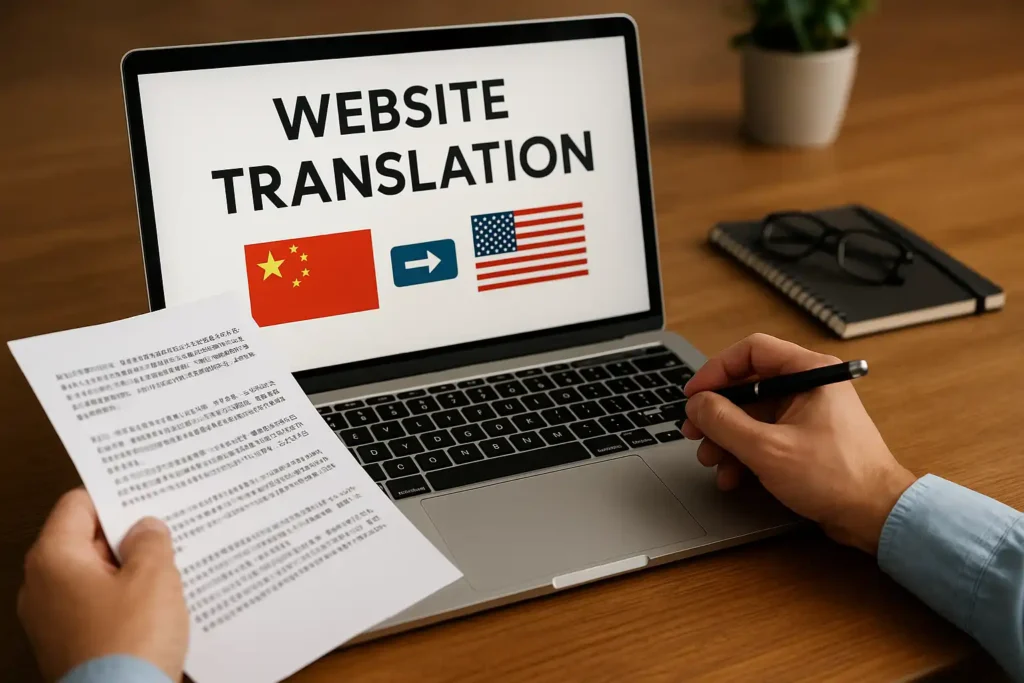Website translation and closed captions go hand in hand when expanding into China’s video-first digital world. Learn how quality captions improve accessibility, meet legal standards, and connect you with Chinese audiences more effectively.
Things to Consider Translating Your Website
A professional translating a website on a laptop, with ‘Website Translation’ shown on the screen, and Chinese and English text visible—representing cross-language localization.

📝 Written Texts for Target Regions
Before beginning your website translation, decide which region you’re targeting:
- 🇨🇳 Mainland China: Use Simplified Chinese
- 🇭🇰🇹🇼 Hong Kong & Taiwan: Use Traditional Chinese
✅ Want to reach more people? Consider translating into both.
💡 Talk to your translation provider about cost-saving options, such as reusing content or using translation memory. These can help reduce time and cost in your website translation process.
🔍 SEO Strategies for Baidu
Baidu is the top search engine in China, and most people use it instead of Google.
To improve visibility:
- Translate your content into high-quality Chinese
- Make sure Chinese pages are in HTML format (not just PDFs or images)
- Focus on useful, relevant content for better indexing
📌 Reminder: Some users have VPNs, but most use Baidu daily.
🔑 A well-optimized website translation ensures your Chinese content is indexed properly and reaches the right audience.
🌐 What to Translate (and Transcreate)
Not everything needs to be translated at once. Start with the most important:
- Product descriptions
- Service pages
- Brand slogans or taglines
🎯 For creative content like ads or banners, use transcreation—a creative translation that adapts for local culture.
🛍️ Retail and service websites also benefit from light copyediting to sound natural in Chinese. Make sure this step is part of your website translation workflow to maintain quality.
🌍 Website Hosting in Mainland China
Hosting in China is optional, but it offers advantages:
- 🖥️ Faster loading speed for users in China
- 📄 You’ll need an ICP Beian License to host inside the Mainland
- 🧩 Be ready to manage both English and Chinese versions
💡 If you’re hosting outside China, use a CDN with edge servers in places like Hong Kong or Singapore to support your translated website content as part of a seamless website translation strategy.
🛠️ Dedicated Tech Support
Don’t forget: a translated site still needs regular updates and support.
✔️ Make sure you have:
- ✔️ Make sure you have:
- A tech person familiar with multilingual websites. For best practices, see Google’s multilingual site guidelines for managing translated and localized content effectively.
- Regular check-ins to keep your Chinese content fresh and accurate
- A local team who can help maintain SEO and fix issues
How to Work with Translation Agencies
- Prepare a List of Pages
There are various ways to prepare for the translation process. Use spreadsheets to prioritize content and track progress.- SEO specialists can use this list to optimize content for Chinese search engines.
- Ensure Content Is Translatable
Writing in simple English is a way to ensure content is easily translated. There are benefits to avoiding jargon and colloquialisms to streamline the process. - Provide a Glossary and Style Guide
There is a need for a glossary and style guide to improve the quality and accuracy of translations. Translators can better understand specific terminologies in context. - Request Quotes and Samples
There are many translation agencies, but asking for samples or tests can help you evaluate their quality. Request a quote for your project and negotiate rates for repetitive words detected by CAT tools.
Don’t Overlook Multimedia Content
In today’s digital landscape, website translation also involves localizing multimedia elements. If your website includes product videos, tutorials, or promotional content, consider adding Chinese closed captions or voiceovers. This helps engage users who prefer watching over reading—and improves accessibility. Localized video content can boost dwell time, search engine visibility on platforms like Baidu and Bilibili, and user trust across regions. A holistic localization approach ensures your site isn’t just translated, but truly resonates with Chinese audiences.
Why Translate Your Website?
There is no longer a physical barrier for Chinese customers to engage with your business. With just a few clicks, they can visit your website, browse products, and watch videos. A localized website improves user experience and opens doors to new markets.
Ready to Take the Next Step?
Partner with the right Chinese translation agency and treat the collaboration as a long-term investment in your business’s growth. A thoughtful website translation strategy not only removes language barriers but also helps you build credibility with Chinese customers across platforms and regions.
Let us know how we can help you succeed—whether it’s your first step into the Chinese market or an upgrade to your existing localization efforts.
